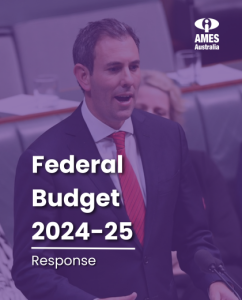Federal budget offers restrained relief
The 2024 federal budget will see Australia’s migration and refugee programs remain as significant parts of the nation’s political and economic lifeblood.
The migration program will see an annual intake of 185,000 permanent migrants, with 70 per cent of visas going to the skilled migration program.
This is a halving of recent annual migration intakes but a return to pre-COVID levels.
There is a continuing commitment to 20,000 humanitarian places for the next two years and an increase in funding in recognition of the importance of providing specialist settlement services to ensure refugees can settle well in Australia.
The federal budget also earmarks an extra $120.9 million for refugee resettlement over four years.
 People fleeing the conflict in Gaza and Israel will be supported with allocations of $2.9 million for emergency financial assistance and Medicare access while $1.9 million will be allocated for Medicare for Ukrainians on bridging visas.
People fleeing the conflict in Gaza and Israel will be supported with allocations of $2.9 million for emergency financial assistance and Medicare access while $1.9 million will be allocated for Medicare for Ukrainians on bridging visas.
The Government has also allocated $1 billion over five years to establish the new Administrative Review Tribunal, as part of its much-needed reform of Australia’s administrative appeals process.
The cost-of-living relief contained in the budget will also help migrant and refugee families make ends meet.Every household will receive $300 in energy bill subsidy, there is a 10 per cent rise in federal rental relief and the modified stage 3 tax cuts will provide a tax break to everyone earning above the tax-free threshold of $18,200.
Also, changes to indexation of HECS debts will eliminate $3bn worth of HECS debts.
The budget also provides almost a billion dollars in new money to tackle gender-based violence.
The budget measures are an attempt to tread a fine line between providing cost-of-living relief while not driving up inflation.
The mental health sector will get an extra $888 million over eight years, including almost $600 million for a digital platform to support 150,000 Australians with less intense mental health needs.
The budget includes a promise to build 1.2 million new homes over five years, $6.2 billion in new investments and a total spend of $32 billion under the Homes for Australia plan. There is also $1.9 billion for more loans to build 40,000 social and affordable homes.
The budget includes $3 billion in funding for pharmacists which will see scripts frozen at $31.60 for a year.
Also in the budget are initiatives aimed at creating pathways to employment.
The $21.9 million WorkFoundations program aims to fund social enterprises and other businesses that assist people with complex barriers to work and pay real wages. It includes funding for jobs-focused social enterprises to get certified.
Also, the $32.1 million Real Jobs, Real Wages program, will support jobseekers experiencing long-term unemployment to build their abilities by providing a tapered subsidy to employers that can provide secure and supportive job opportunities.
The federal budget includes the second surplus in a row, of $9.3bn, followed by a $28.3bn deficit in 2024-25 due to a raft of “unavoidable” investments in government services and a $7.8bn cost-of-living package.
It includes Treasury forecasting a deficit of 1 per cent of GDP in 2024-25 during the crucial period during which the Reserve Bank will be deciding whether to end a cycle of 13 interest rate rises in the past two years.
Migrant and refugee settlement agency AMES Australia has welcomed measures announced by the federal government in its 2024 budget to enhance Australia’s commitment to resettling refugees.
CEO of migrant and refugee settlement agency AMES Australia also welcomed budget measures that support women at risk from family violence as well as cost of living relief for vulnerable families and communities.
“We welcome the commitment to 20,000 humanitarian places for the next two years and an increase in funding in recognition of the importance of providing specialist settlement services to ensure people can settle well in their new home,” Ms Scarth said.
“The commitment cements Australia’s place as a global leader in refugee resettlement.
“We also welcome the budget’s strategic investments in building a skilled workforce, including towards enhancing the green economy and the care economy, where we know many migrant and care workers are employed,” Ms Scarth said.












